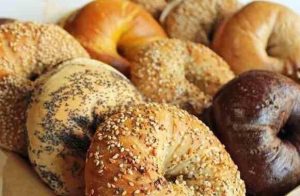 In the last ten or twenty years bread has become the diet devil. What a fall from grace for a dietary staple that was once considered a divine and spiritual food. Didn’t God shower it from heaven on the Israelites for crying out loud? How bad can it be?
In the last ten or twenty years bread has become the diet devil. What a fall from grace for a dietary staple that was once considered a divine and spiritual food. Didn’t God shower it from heaven on the Israelites for crying out loud? How bad can it be?
On January first I gave up bread. It wasn’t a New Year’s resolution, as much as one part of a healthier eating and exercise plan, which always makes it to my top three annual promises to myself. But this year was different. I love food and I’ve never given any of it up cold turkey and with no exceptions. I’m not going to lie: the first 30 days were miserable.
Giving up bread felt like an obvious choice, as deleting it from my diet didn’t deprive me of anything but empty calories and carbs that seem to be highly attracted to my perimenopausal gut. It’s not like I swore off healthy whole grains like quinoa, brown rice or sweet potatoes… Just the highly processed kind that is slowly (but surely) forming a cushioning ring around my midriff (And hips. What’s up with the new hips?). Because I’m an all-or-nothing kind of girl, I swore off even the supposedly less-processed, organically sprouted variety that sports a biblical name and lulls me into a false sense of confidence, making me wonder if it’s been blessed by the diet gods. Yeah, you know the one.
Bread deprivation was rough and perhaps rougher due to the numerous other staples I’d trimmed back as part of my January health plan. But somehow, I didn’t miss brownies, apple pie, french fries, pizza, cheeseburgers and fried buffalo chicken nearly as much as I missed that crusty bread and butter that arrives at the dinner table piping hot, and complements my glass of red wine so perfectly. Because I wasn’t eating bread every day, giving it up seemed like an achievable goal. Imagine all the calories I’d save by just not eating bread?
I’m not a fan of deprivation, so the premise of any health plan I adhere to is eating so much good stuff that it crowds out the bad. I thought about giving up bread a lot before actually doing it (isn’t acknowledging a problem the first step towards fixing it?) and slowly started cutting back during the holidays (but don’t feel sorry for me, I made up for the reduction in bread intake with plenty of holiday junk).
Bread was not only a staple, but an important and ritualistic part of my upbringing. I grew up eating at least two slices of toast for breakfast each day. While I love eggs, I couldn’t imagine them loose on a plate without bread to hold them together. We weren’t a religious family, but always had Challah on Friday nights. Our Sunday morning bagels were so ingrained that they took on a spiritual connotation. My mom drove two towns over at the crack of dawn to get the especially crusty and fluffy ones, which waited downstairs when we finally woke up. My first job in Manhattan began each morning with a walk to work, but not before stopping at my favorite cart for a bialy and coffee. Sometimes I switched it up and had a buttered roll, but a day didn’t start without bread. Even today, my ultimate happy foods (pizza, crackers and cheese, pita crisps and dips) all masquerade essentially as bread. So for me, bread deprivation is a killer.
Naturally I’ve been a little cranky. And resentful. Haven’t my 40s ushered in enough issues and wouldn’t a fresh baguette make everything better? And how come those French women eat bread all day and look like twigs?
The hardest part for me is dining out with friends or curbing myself at get-togethers. The second the bread basket arrives and I don’t partake, the questions begin: Are you on a diet? Why do you have to diet? What kind of diet are you on? Don’t my friends know it’s exhausting and I need to save my energy for resisting bread?
Three weeks into my new bread-free life I broke down and had pizza. I rationalized that extremes are not healthy and that “everything in moderation” is a more mindful mantra than “no bread.” But the stomach cramps and bloating I experienced that night served to remind me that something good was probably happening inside when I quit bread, and I was encouraged to continue. I had another relapse on Super Bowl night when I consumed an entire loaf and several pounds of cheese sans help. After paying the price for many days later, I was encouraged to continue – but now it’s a significant cut back, not an absolute rule. Total abstinence will just not work for me.
